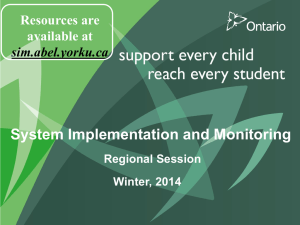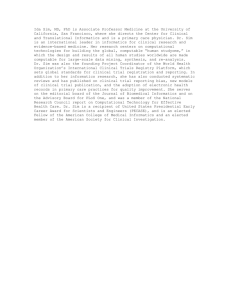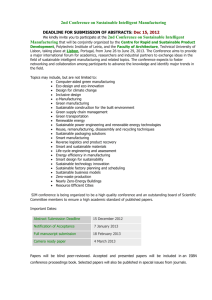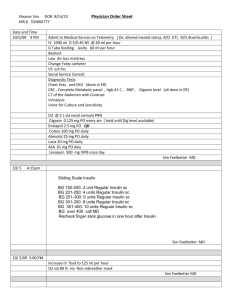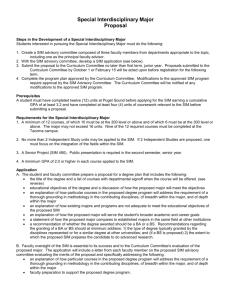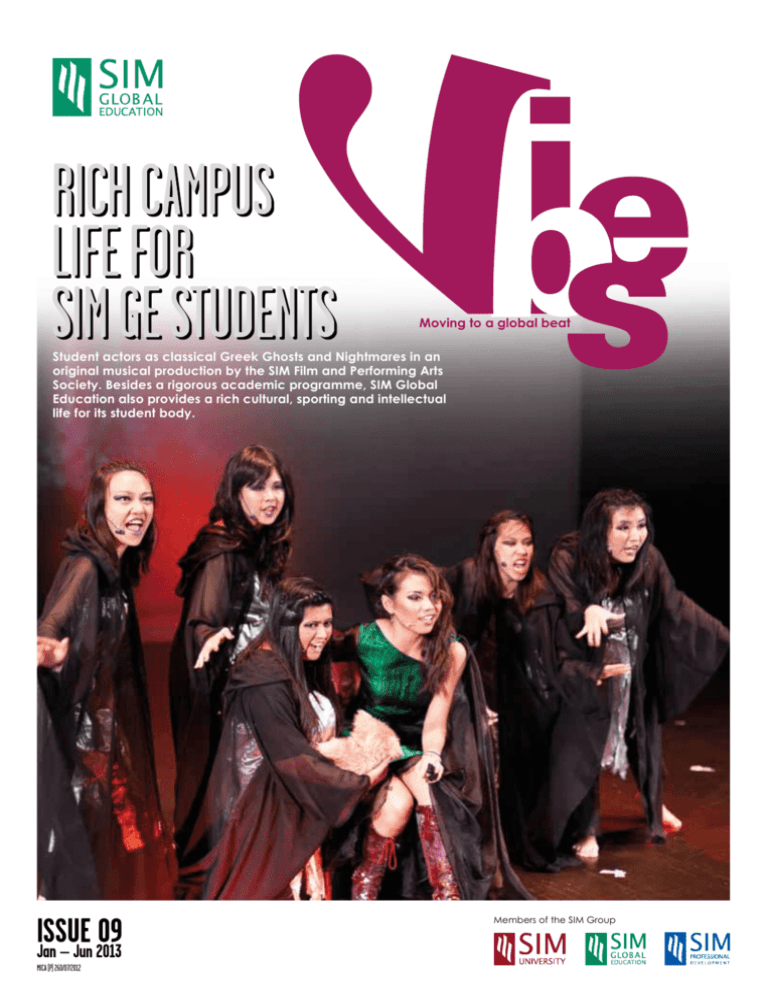
Moving to a global beat
Student actors as classical Greek Ghosts and Nightmares in an
original musical production by the SIM Film and Performing Arts
Society. Besides a rigorous academic programme, SIM Global
Education also provides a rich cultural, sporting and intellectual
life for its student body.
ISSUE
09
Jan – Jun 2013
MICA (P) 260/07/2012
Members of the SIM Group
An
internship
today,
work with
a star
tomorrow.
Former hospitality & hotel management student Jonathan Leong (right) as an intern at celebrity chef Tristan’s kitchen in London
Through the SIM Internship Programme both
overseas and in Singapore, students get to meet
business leaders, executives, entrepreneurs and
even celebrity chefs. They get great networking
opportunities and practical exposure across a
variety of industries. Such engagements allow
employers to assess potential hires, fresh ideas
and mindshare of the next generation workforce.
Reassess your recruitment strategy, find out what
SIM students have to offer.
Contact us:
Office of Internship and Industry Engagement
Phone: 6248 0075 / 6248 0114 / 6248 9785
Email: intern@sim.edu.sg
Foreword
Fulfilling
tertiary
aspirations of
young people
Every family in Singapore wants their child to get a
degree, so says Prime Minister Lee Hsien Loong. In
1980, only 5% of students went to publicly-funded
universities, but today it’s 27% and soon it will be
30%. And that is only NUS, NTU, SMU or UniSIM, not
counting students going overseas or in the private
sector, says Mr Lee. The Prime Minister was speaking
at the groundbreaking ceremony at Yale-NUS College
in July 2012.
although they may not be in Birmingham, Buffalo,
London or Wollongong, the young folks nonetheless
do indeed enjoy a rich, stimulating campus life
outside of the classroom.
As Mr Lee notes, “for as many as those who make it
to university, still more aspire to such a university
education”. At SIM Global Education and other
major private education providers, we try to help
fulfil that aspiration.
Pursuing a degree study programme is no easy matter,
particularly in financial terms. If the student is unable
to enrol in one of the publicly-funded universities, the
traditional choice is to go overseas. Cost increases
exponentially, when taking into account the travel,
accommodation, food and other living expenses,
without even considering the school fees.
The practical alternative is still to pursue the foreign
degree but to do so in Singapore, usually at half the
cost. However, there is still the criticism that when
one pursues for instance, a New York State University
degree programme in Singapore, it is not as enriching
as studying in New York state itself.
Private education institutions that offer overseas
university programmes have tried to address this
issue by building larger physical facilities and
encouraging students to organise social, cultural,
artistic, intellectual and sporting events. The
overheads for these extra curricular activities would
be borne by the institution, so there’s no burden on
the students except to commit their time and energy.
In this issue, we highlight (on the centrespread
pages) the many events organised by the student
clubs at SIM Global Education, and the enthusiastic
participation of the students, from musical concerts
to investment symposium and sports. Students are
given every opportunity to rise and shine and show
off their talent, whether as leaders, public speakers,
athletes, drama actors or even economics gurus. So,
Judy Wong
Director
Business and Marketing Relations
judywong@sim.edu.sg
VIBES serves as a platform to highlight the achievements of SIM
Global Education (SIM GE) students, alumni as well as campus
trends and happenings to industry partners and fellow students.
VIBES is a bi-annual publication by SIM GE. The featured articles
are written by SIM GE students who are undertaking the various
programmes offered by our partner universities:
•
•
•
•
•
•
•
•
•
•
•
IMI International Hotel Management Institute, Switzerland
RMIT University, Australia
The University of Manchester, UK
The University of Sheffield, UK
The University of Sydney, Australia
The University of Warwick, UK
University at Buffalo, The State University of New York, US
University of Birmingham, UK
University of London, UK
University of Stirling, UK
University of Wollongong, Australia
On cover: Rich cultural activities on SIM GE Campus
Singapore Institute of Management Pte Ltd (SIM), 461 Clementi Road,
Singapore 599491
Copyright © 2013 SIM Global Education. All rights reserved.
Reproduction in whole or part without
permission is prohibited.
Design Agency: www.tool.com.sg | Printer: KHL Printing
3
Education Focus
The paper chase and
its impact
With widespread opportunities in acquiring tertiary credentials,
what is the impact on society and the working individual?
Not all papers are the same, says Dr Timothy Chan,
himself a holder of the ultimate qualification in the
paper chase game of life.
The academic director of SIM Global Education
(SIM GE) with a PhD (Education) under his belt,
says chasing after credentials is quite different
today than those days of the 1970s and 1980s.
“Gone are the times when a piece of paper
guaranteed jobs and promotions,” says Dr Chan, 53,
who has worked for almost 30 years in the education
industry. “In the past, there were even certain job
sectors where you would get a pay rise when you
acquired, say, a post-graduate qualification.”
Today, the piece of paper is still necessary
but insufficient not just in getting a job but in
career advancement, Dr Chan points out. When a
prospective employer is interviewing you, he or
she wants to see a detailed list of your grades (the
transcript that accompanies your degree), and the
reputation of the university that awarded it to you.
Your bearing and performance during the interview
session counts too.
In Singapore, according to the Ministry of Education,
with 22 institutions (including five polytechnics and
several business schools) awarding degrees and
diplomas, there is concern that as more people have
the opportunity to acquire tertiary qualifications, it will
lead to even more people wanting to do so, resulting
in a cycle of one-upmanship: because most of my
friends and neighbours have a Diploma, I need to have
a Bachelors so I don’t lose out to them in work and
job-hunting. And when everyone wants to surge ahead
with a Bachelors, I would have to get a Masters.
Consequences
Credentialism, the mind-set or obsession with
obtaining a tertiary qualification for the sake of the
paper, could lead to a phenomenon known as “degree
inflation” – meaning a lowering of the perceived value
of university degrees because more people have it.
This scenario is already happening in many places
in the world, and Singapore is certainly not spared.
Jobs that were once filled by diploma holders now see
many graduates with degrees applying for them.
4
In some cases, Dr Aaron Tan, who is Director of the
Teaching & Learning Division at SIM GE, noted that
even post-graduates with Masters degrees apply for
these positions, thus leading employers to raise the
academic requirements.
When most working adults are expected to possess
at least one basic tertiary credential, employers will
take it as a matter of course to demand that job
candidates have such qualifications, says Dr Tan, who
holds a Doctor of Education (EdD).
“A point in time may come when some employers may
equate the possession of a degree to a certain level
of intelligence and drive in a candidate,” says Dr Tan.
“Hence to such employers, if you have no degree, you
may be viewed as a lower class of workers, which, of
course, is not necessarily true,” he adds.
Such perceived demands have driven many to pursue
higher education, but this, without government
subsidy, does not come cheap. A worrying trend
of debt accumulation has been observed around
the world among young people who have not even
started working for a salary.
In the United States, according to NBCNews.com,
the average college student who graduated in 2011
had US$26,600 in student loans. Two-thirds of last
year’s college graduates had student loan debt. The
total of all student debts in the US has topped US$1
trillion, sparking debate over whether a college
education is worth the price in the current poor job
market in the country.
Dr Timothy Chan, 53, reminds you education is only a foundation
to build your career
Education Focus
In Singapore, the National University of Singapore,
for example, published its tuition fees for 2012-2013,
which range from S$7,460 for Arts and Social Sciences
to $8,420 for Business, $7,460 for Computing and
$10,000 for Law. The fees are what Singapore citizens
pay, after subsidies from the government. The full cost
is, on average, three times higher.
Impact on the economy
On a nett basis, a working population where the
majority are tertiary educated, is a plus for the
nation, says senior lecturer Dr Seet Min Kok who
teaches economics at SIM GE. “If more people are
highly educated, you are able to mobilise a more
capable workforce to take on the challenges of an
evolving economy,” says Dr Seet, Ph.D (Economics).
He points out that the advent of technology means
companies are always competing aggressively in
terms of new and innovative products and services
just to survive. They would need capable and talented
professionals to help them succeed.
Dr Aaron Tan, 48, suggests you may like to augment your
tertiary learning with MOOC or massive open online courses
on the Internet. MOOC is free, although you may not get any
credential for your effort
Every family in Singapore wants their child to get a degree. And if you look at
the enrolment in our universities in the last generation, it has gone up five, six
times. In 1980, only 5% of students went to publicly-funded university; today
27% do. And soon, it will be 30% going to the publicly-funded universities, and
that is just NUS, NTU, SMU, or SIM. And it doesn’t even count those who pursue
their degrees overseas or in the private education sector. If you add those
in, about half our people in their 20s have university degrees of one kind or
another. But for as many as those who make it to university, still more aspire
to such a university education.
– Prime Minister Lee Hsien Loong, at the Yale-NUS College groundbreaking ceremony, July 6, 2012
“A well-equipped, highly-skilled workforce with
relevant degree-level qualifications would therefore
drive the economy forward.”
Germany is the best example of a thriving economy
driven by a highly-qualified workforce. But today the
country faces a happy problem: ensuring an adequate
supply of skilled workers to sustain long-term
economic growth.
In August 2010 Federal Minister Rainer Brüderle
launched a skilled labour campaign in cooperation
with the German industry. Working together,
government and industry aim to take the necessary
measures to secure and strengthen the supply of
skilled workers and specialists, not just from its own
population, but from foreign talent.
A business report on www.dw.de, June 4, 2012,
stated that the federal government was looking for
solutions to the lack of professionals in Germany.
Mathematicians, scientists and computer specialists
were among the groups most needed.
As the unemployment rate dropped, the number of
unoccupied positions has increased. The most recent
report showed that nearly 500,000 jobs in Germany
are opened, 29,000 more than in May 2011. Skilled
workers were especially needed in the areas of
mechatronics (a hybrid of electronic, computer and
mechanical engineering), electronics, manufacturing,
logistics, health and trade.
Personal strategies
As individuals, we should not be unduly concerned
that there are too many people with tertiary
qualifications. Credentials are a fact of life, so
develop a strategy to acquire lifelong learning:
if you already have a basic degree, consider a
Masters, or some other post-grad qualification
in an area that you’re most passionate about, says
Dr Tan.
Don’t just look at traditional areas of study, Dr Tan
advises. “The time has come where many new areas
of opportunities are open, such as the liberal arts
where there is great potential.”
5
SIM Focus
Gaining global perspective with
SIM’s Edu Abroad programme
Stephanie and Si Min share their
immersion at LSE and Cambridge University
It wasn’t just books, lectures and exams for
SIM-University of London graduates Tan Si Min and
Stephanie Shayne Ora. While they were students with
SIM’s University of London academic programmes,
they took the opportunity to sign up for SIM’s
Education Abroad programmes, participating in
overseas summer schools; interning abroad; and
contributing to community service.
“Over the course of the three years I have spent at SIM, I
had been engaged in activities such as entrepreneurial,
charity and sporting events, as well as three Education
Abroad programmes,” says Si Min, 23 (Bachelor of
Science (Honours) in Economics and Management).
Insightful engagement at LSE
She attended six weeks of
classes at the London School of
Economics. “Apart from the mindintriguing engagements I had with
my professors during lectures
and tutorials, I also had insightful
exchanges with fellow students,”
she says.
Working in China
Si Min also worked for three months as an intern at
the Sino-Singapore Guangzhou Knowledge City in
Guangzhou city, China. While there, she experienced
firsthand the unique China style of social networking
known as guanxi.
She felt troubled by this kind of “old boys network”
practice but notes that it remains “one of the most
effective and prevalent means of facilitating effective
business negotiations in the Chinese corporate culture,
and it is certainly a skill that one has to be attuned to,
in business engagements with the Chinese”.
After graduation last year, Si Min now works in the
civil service.
Education abroad in the UK for Si Min (fourth from left) and other SIM GE students
Being away from home allowed
Si Min to discover within herself
a new sense of independence and
to take full responsibility for her
own actions.
Si Min also participated in SIM’s
six-week Summer Institute in 2011.
Here, students examined concepts
related to the theme “Economic
Competitiveness, Innovation and
Creative Cultures”. The programme was conducted by
prominent senior faculty from overseas.
The accumulation of such diverse and intellectually
stimulating experiences has helped shape the perspectives
that she has today. She strongly believes students must
possess a strong conviction to want to learn if they are to
thrive in any educational setting.
Enrolment in these programmes is currently voluntary. But
should it be made compulsory to all university students?
Well, according to Si Min, in order to truly benefit, the
student must go in with a willing heart and a hungry
mind, regardless of whether it’s voluntary or mandatory.
6
Stephanie in China
Stephanie who hails from the Philippines, also
benefitted greatly from the Education Abroad
programmes. A graduate of SIM-University
of London’s Bachelor of Science (Honours) in
Accounting and Finance, she attended the SIM
Global Corporate Learning Programme in Beijing
and Tianjin, went to Cambridge University and even
taught in Nepal.
Before her China trip, what she knew of the country
were stereotype facts: China is a sleeping giant, the
third largest country by land size, and the largest by
population, and that Beijing is the capital.
SIM Focus
Stephanie in Cambridge immersing herself in its rich intellectual life
“Beijing and Tianjin were the first major cities I got to visit
in China. I saw an example of a real Chinese business and
realised how much Chinese businesses and organisations
care for the environment and their people.
“I’ve under-estimated China, because what I knew of it
was rather shallow, yet I never bothered to challenge
this perception. By experiencing China myself, I got to
debunk myths that used to limit my understanding of
the economy, and more so, I managed to gather valuable
insights useful for my career decisions.”
Cambridge passion
In 2012, after she graduated from her SIM-University of
London studies, Stephanie enrolled in the SIM Global
Immersion Programme at Cambridge University.
“Nepal was an opportunity for me to open up and simply
live my life without any hesitation and limits,” says
Stephanie. “Living a simple life in the mountains made me
notice the things I have and I am capable of, which I have
regarded as invisible for quite some time.”
The genuine smiles of the village kids were inspiring
since it would be quite impossible to see that kind
of smile on the face of children in a developed urban
society, Stephanie says. “Nepal was, is and always will be
a life-changing activity because as the first programme
I joined, I developed a trust in Education Abroad. Since
then, that kept me coming back for more,” she adds.
Stephanie now works as an Associate in the Financial
Advisory Services arm of Deloitte Philippines.
She noted how the passion of the professors influenced
her appreciation for studying. The method of teaching
at Cambridge involved outdoor learning, corporate visits
and regular class participation.
She mentioned Professor Charles Hampden-Turner,
who throughout the course emphasised the idea of
metaphors, paradoxes and ironies. Sometimes she felt
confused but in a funny way, all the confusing ideas
somehow made sense.
“I love the idea of how things co-exist such that even
the seemingly systematic world of business has to have
differences and conflicts for companies to survive and
grow,” she adds.
Life-changing in Nepal
Stephanie also participated in SIM’s Global Citizenship
Initiative in 2010 because she enjoyed community work.
She went to Nepal where she taught pre-primary school
pupils for seven days.
SIM Education Abroad offers high-quality
signature programmes that challenges
our students intellectually, professionally,
and socially. We aim to develop globallycompetent individuals committed to shaping
the world.
For 2013, we are launching Global Immersion
Programmes in Finland, Spain, Estonia and
Cambridge, UK; strengthening our corporate
and internship programmes in China;
continuing our social engagement in Nepal;
while exploring cutting-edge current topics
in the SIM Summer Institute.
7
HR Focus
Dispelling Hierarchy
Two organisations on how to manage and mitigate the
effects of hierarchy, in order to build communication and trust
The boss says you were given ample time to
complete an assignment but you know it is barely
enough. You keep silent because you worry about
job security. The relationship sours, and in time you
decide to leave the company.
Judging from anecdotal accounts and employee
engagement surveys of human resource
consultancies, the above is a common scenario.
In Don’t Kill the Bosses!: Escaping the Hierarchy
Trap, Samuel Culbert and John Ullmen examine
the issue of hierarchy in organisations. They
say: “Had we done a double-blind study,
we couldn’t be more convinced that bosssubordinate relationships constitute the number
one selling agent for tranquillisers, antacids,
and beta-blockers. They probably account for
more people losing their jobs than market
down-turns and personal incompetence.”
The Singapore Institute of Management
recently conducted a survey on the attitudes
and sentiments of mid-level to C-suite
managers from different organisational types
in Singapore. In the study, about 37 percent
of respondents said in their organisations, key
decisions only come from top management.
About 28 percent indicated their organisations
have a hierarchical management structure.
By Jason Soon
at the Workplace
Culbert and Ullmen recognise that hierarchy
can serve a useful purpose in providing a basic
structure and an orientation towards accountability
in organisations. To some extent it can be a
resource for settling jurisdictions and disputes.
They recognise the darker side of organisational
hierarchy, specifically when human relationships
become corrupted.
It is not the hierarchical structure that creates
problems, but hierarchical relationships. Culbert
and Ullmen write: “It almost always limits truthtelling, authenticity, openness, and give-and-take
exchanges. In fact, nothing is more detrimental
to the spirit of teamwork than hierarchy. Nothing
more quickly attacks feelings of camaraderie and
self-esteem. Hierarchy blocks originality and causes
people to place efficiency and uniformity ahead
of functional effectiveness and actual results. In
problem-solving, hierarchy leads to convergence at
the top, produces status-dominated thinking, testing
the waters double-talk, and constraints to people
acting sensibly. It leads to participation by the
numbers, filtered information, cover-ups, alienation,
disorientation, anger, and depression.”
This picture has to be balanced with cautious
optimism. About 34 percent of respondents said
their organisations encourage innovation and
change. About 28 percent said their organisations
have an engaging work environment that allows
people to perform at their best.
The notion of hierarchy has been defended since
the 1990s. In a 1990 Harvard Business Review
article, Elliott Jacques argued for the preservation of
hierarchical organisational structures. According to
Jacques, hierarchies are justified in two ways. First,
the type of tasks performed by each employee varies
in complexity. Second, the amount of time the task
extends into the future also varies among employees
from lower to higher levels. The problem in most
organisations is not with the hierarchical management
structure but the insufficient difference in the weight
of responsibility between hierarchical levels.
8
Anna Fok, chief human resource officer, Jurong
Health Services (picture), says: “Governance is key and
HR Focus
organisational hierarchy can serve as a check-andbalance tool to ensure decisions made are aligned
with the corporate and clinical governance framework.
However, an over-emphasis on hierarchy may breed
bureaucracy and dampen the initiative to act.”
Finally, NEA conducts a biannual Organisational Climate
Survey. They use focus group discussions to ascertain
relationship between staff and management. The
results are reviewed by management, with improvement
actions taken.
A spokesperson from the National Environment Agency
says: “Prompt response to situations and public
feedback is an important aspect of our work. While too
many layers of hierarchy could impede growth as key
decisions take longer to be made, there is still a need
for some hierarchy to provide structure for information
to be cascaded efficiently. Striking a balance between
empowerment and delegation, with established protocols
and standard operating procedures, is useful.”
Two-sided accountability
To bridge the human relations gap brought about
by hierarchical relationships, Culbert and Ullmen
advocate a two-sided accountability, characterised by
positive politics where there is clarity about which areas
employees are responsible for, and managers know what
type of activities they are accountable for.
Strategy for managing hierarchy
Anna says: “Trust forms the corner-stone of relationship
building as we grow as an organisation. To narrow power
differences and break down communication barriers
attributable to title and reporting structures, we embark
on a team-building and team-development strategy to
flatten hierarchy through fostering strong bonds and
trust among team members. At the same time, this
enhances team performance.”
Here are some steps managers could take after giving
out assignments. They could walk to the employee’s
desk after a few days and ask questions like “What’s on
your mind?”, “How are things going?”, and “Are you going
to need my help?” The boss gets involved by learning
about the subordinates’ needs and helping him or her
access it.
Managers should seek every opportunity to build trust
with their employees. These opportunities are especially
abundant during difficult times when employees show
signs of incompetence.
Jurong Health Services staff are encouraged by the
leaders to think outside the box. They use space and
autonomy to re-create new ways of doing things,
including the processes to integrate care for patients
and community. The focus on team collaboration will
diminish organisational power differences as all staff
share the same goal and set of core values.
As for the National Environment Agency, “we
promote and encourage constant dialogue and open
communications,” says the spokesperson. “All officers
are aware of the challenges and key priorities, and how
these should be dealt with. We constantly remind our
management on the need to be close to the ground to
fully understand the issues. We arrange for directors and
heads of departments, HODs, to mingle with new hires,
so that from the point of induction, our officers feel
comfortable to approach them.”
In addition, they organise social and human resource
events where management can get to know officers
better, remind each other of common goals, and share
on how to improve the organisation. They use a common
gym, tennis court and canteen to facilitate interaction
and reduce power distances.
Other internal events include workplan seminars, roadshows, and forums where diverse topics such as service
excellence and operational excellence are discussed.
This article was first published in the December 2012
– January 2013 issue of Today’s Manager
9
Campus News
Awards for
student leaders
Alumni homecoming
The inaugural Student Leadership Awards in 2012 were
presented to leaders in the student councils who have worked
diligently to create a vibrant SIM campus life. There were four
categories: the Impetus Awards, Impact Awards, Helm Award
and Crest Award. The presentation was on November 30, 2012.
SIM GE’s CEO Adjunct Professor Lee Kwok Cheong addresses
alumni at the 20th Year Homecoming, October 12, 2012, which
saw nearly 70 returning alumni from the Class of 1992 and earlier.
Left, SIM GE’s Ho Soon Eng with Crest recipient Daniel Ho.
Right, SIM GE’s Sylvia Yeo with Helm recipient Joel Ho.
What ails the
world’s economy?
Student leader recipients of the Impact awards.
Full house
for Cupid’s Love
SIM GE Chairman Gerald Ee (left) with student leaders of the SIM
Economics Society organising the annual exhibition on the parlous
state of the world’s economies, on September 27, 2012. From left
(black suits), Sebastian Phua, Ng Gee Jing, Geetha Selva Raj and
Malcolm Chen Jun Ho.
Cupid the
god of love
falls in love
himself but
is obstructed
by Ghosts
and
Nightmares
in the
original
musical
production
by the
Film and
Performing
Arts Society
on October
13, 2012.
10
Campus News
Sin Chow Hanoi!
Hello Hanoi! The 2012
Overseas Alumni
Chapter (OAC) event in
Vietnam was held in the
Capital, a change from
Ho Chi Minh City where
the previous two years’
events were held. On
a cool November night
in the Intercontinental
Hanoi Westlake, close
to 90 alumni, SIM staff
members and industry
partners gathered
for an evening of
reminiscences, feasting
and games organised by
a local committee
led by alumni Miss
Nguyen Huong Van and
Miss Eve Nguyen.
Mr & Ms SIM, SIMply entertaining
Lim Miaw Fen as Jane, and Aaron Poh as John, the central characters of the first-ever combined
arts concert featuring 90 students from five arts club on December 1, 2012. The two-hour
musical was written and directed by SIM-RMIT graduate Terrence Yang. Mr & Ms SIM also
included individual dance and music items by SIM clubs Dance Art, Dancesport, DreamWerkz
and String Ensemble.
The cast of characters
in Mr & Ms SIM
Jobs and global economy
At the Youth Financial Symposium organised
by the SIM Investment & Networking Club
on January 26, 2013, student moderator
James Wu (left) directs questions on how the
global economy affects investments and jobs.
Speakers are (from left) Melvin Tan (chairman
SIAS Youth Chapter), Song Seng Wun (regional
economist, CIMB Research), and Andrew Chow
(head of research, UOB Kay Hian). About 400
students from SIM Global Education, NTU, NUS,
SMU and UniSIM attended the day-long event.
11
SIM Partners
Diverse range of jobs for retail grads
The cohort of full-time students and working retailers in this programme is impressive
Retailing, a diverse industry, is one of the key drivers
of the economy, says Dr Jonathan Elms, Associate
Professor at the University of Stirling’s Institute for
Retail Studies.
“Compared with the well-established economies in
the West, retailing is doing well in Singapore,” says
Dr Elms, who specialises in research into retail chains
and consumer behaviour.
“And students who are studying retail marketing
can look forward to a wide range of jobs, from store
management trainees to merchandisers, advertising
designers and even in HR,” he says.
The programme allows me to
have a better understanding of
a company’s structure. Also, as
my company wishes to extend its
business into retail, I can use the
knowledge I gain from my studies
to help my company search for
the right market, products and
services to invest in.
Currently, Dr Elms is in Singapore teaching the
subject at the SIM-University of Stirling Bachelor
of Arts (Honours) programme in Retail Marketing.
The 33-year-old programme director says he is
impressed with the present cohort, a mix of full-time
and part-time students. Many of the part-timers
work in retailing or marketing.
The opportunity to apply what
was covered in the lecture
materials in challenging projects
and coursework.
– Olivia Teng Li Chin, 20, on the
most interesting aspect of the retail
marketing programme
The first intake at SIM was in September 2012 and
the students are expected to graduate in September
2014. The enrolment for this year’s intake closes on
April 6, 2013. Dr Elms who oversees the running of
the programme both in SIM and in Stirling itself in
Scotland, says what is taught at both campuses is the
same in quality and consistency.
Retail Marketing at SIM GE
Stirling’s Institute for Retail Studies started in 1983.
Over the years it has built up a reputation in retail
and consumer behaviour research. In September
2011, it was announced that SIM
Global Education and the University
Dr Elms in the Retail Marketing class at SIM campus.
of Stirling would be offering a twoyear Bachelor of Arts (Honours) in
Retail Marketing for both full-time
and part-time students.
– Janice Chia Suan Suan, 22, on what aspect
of the retail marketing programme she
could apply to her work
The Singapore Workforce
Development Agency (WDA) is
providing 90 scholarships worth a
total of nearly $3 million over three
years to selected applicants for
this programme. The scholarships
cover 90% of the programme’s fees.
Of the 41 expecting to graduate
at SIM, there are 22 who are WDA
scholarship recipients.
Individuals with the Retail Singapore
Workforce Skills Qualifications
Diplomas in Retail Management will
enjoy credit exemptions.
12
Personality @ SIM
Learning skills to help youths at risk
Psychology course helps Fiona build a solid foundation in human behaviour
By Esther Seah
Fiona Toh has a mission in life
– to help youths who are at risk
of falling into bad company. It
is the motivation that drives her
to take up Psychology during
her polytechnic days and now
at SIM Global Education where
she is in her second year at SIMUniversity at Buffalo (UB), The
State University of New York.
At-risk youths comprise a
broad category, says Fiona,
from those who are charged
in court to those who have
been referred to the police
by their school or parents.
Fiona recalls how she helps
out with such a group who
have to do community
service at an old-age home.
Some of the kids were
indifferent or even hostile
but after spending 14 weeks
with them, she saw a change
in their attitude.
Fiona believes strongly that studies are the only guarantor that you will not be left with nothing
“To be able to see how they changed is what motivates
me,” says Fiona. “I feel a sense of achievement that I
can make an impact in someone’s life.”
Even in secondary school, Fiona was active in helping
other young people. She is currently a voluntary Cadet
Inspector in Nan Hua High School’s police cadet unit
where she mentors new inspectors.
But Fiona realises too that to be more effective in
her social work, she needs a solid foundation in
understanding human behaviour; hence her enrolment
at SIM-UB. She chooses SIM-UB because the American
style of education provides her with an interactive
educational experience that requires students to
understand, reflect and discuss modules.
As SIM-UB’s psychology programme is mostly
conducted by overseas lecturers, Fiona feels that she
has gained diverse perspectives about psychology
now. The curriculum has not only increased her
awareness of psychology, but has also made her
education a more holistic one. Currently, in the middle
of her second year, she has scored mostly A’s for the
modules that she has completed.
I feel a sense of achievement
that I can make an impact in
someone’s life.
After obtaining her Bachelor’s, Fiona plans to work as
a probation officer in the Ministry of Social and Family
Development (MSF). Even if that plan fails, her passion
to work with delinquent youths would continue in
other organisations.
In the longer term, however, she hopes to continue
her education towards a Masters in Counselling.
“Counselling is a vital communication skill in social
work,” says Fiona.
Recognising the utmost importance of academics,
she adds, “With the years of struggling and battling
with thick stack of notes and textbooks, I finally
understood one thing. Many have said that studies
are not everything, yet in my opinion, it is the start
of something, the root of everything, and the only
guarantor that you will not be left with nothing.”
13
Personality @ SIM
Taking on the entire
global economy within SIM campus
Scholar, student leader Sebastian believes in hard work, and learning from past mistakes
By Kenny Tan
Success means having the courage, the determination,
and the will to become the person you believe you
were meant to be, says Sebastian Phua Jun Long,
pulling a quote from George A. Sheehan, a best-selling
author on running.
Sebastian, 24, third year with SIM-RMIT University’s
Bachelor of Business (Economics and Finance)
programme, has indeed achieved much at SIM Global
Education (SIM GE). As president of the SIM Economics
Society in 2012, he led the team in organising the
annual Economics Exhibition in September, impressing
not just students and lecturers in Economics but also
SIM GE chairman Gerald Ee and CEO KC Lee.
The exhibition, breathtaking in the scope of its
coverage, dealt with the ongoing Eurozone debt crises
(there are several), the US fiscal cliff and the sluggish
performance in India and China.
Scholarship achievement
As an SIM GE scholar, Sebastian has been actively
engaged in helping to organise prestigious events
such as the International Youth Summit. He was part
of the main committee as well as the head of the
sponsorship team for the summit.
The SIM GE scholarship scheme is open to all students,
both Singapore citizens and internationals. According to
Sebastian, to apply, you have to write an essay on why
you wanted the scholarship, what you’ve contributed to
co-curricular activities, what you’ve learnt from your cocurricular activities participation, and your job aspiration.
In his application essay, Sebastian very wisely avoided
bragging about his achievements but focused on his
failures and how he is learning from them.
“The toughest part of the scholarship application is the
interview process,” he says. “There’s a panel of highprofile interviewers that include the CEO, Assistant
CEO and Director of Student Life Services. They will
ask you questions which test your soft skills.”
People are inter-dependent
on one another. No man is an
island, and no one can succeed
without the help of others.
14
Competitive credo
Sebastian is pretty competitive. “If someone is
smarter than me, I will make sure that I would
double the effort required to compete with him,”
he says. He firmly believes that hard work pays,
and that nothing comes free in this world.
He also believes that networking is crucial to success.
He recalls from one of the workshops on networking
success, the speaker said that networking is not just
about making friends, but knowing people who will
be there when you need them.
Sebastian thinks that people are inter-dependent on
one another. No man is an island, and no one can
succeed without the help of others.
Career aspiration
In the short term, Sebastian wants to accumulate
working experience as a corporate treasurer. In the
longer term, he hopes to take charge of a company’s
entire finances as its Chief Financial Officer.
Personality @ SIM
Gold for Xuan Yi at
Asean tournament
Flexible study programme for
Singapore’s golden girl of Judo
By Sameeksha Asher
2012 has been a rich year for black-belt Judoka,
Ang Xuan Yi, who won a gold medal at the 16th Asean
University Games in Vientiane, Laos, in December.
The same month she was awarded the Sportswoman
of the Year by SIM Global Education.
Xuan Yi, 23, took up Judo as a sport when she was in
Hougang Secondary School. “In Judo, unlike most martial
arts, you need one good throw or to pin down the
opponent to score the winning point,” explains Xuan Yi.
Beginners start with a light blue belt and work their way
up to a black belt (which is further divided into grades or
dan). She loves the sport because “it tests you mentally
and physically. We have to take exams that require us to
memorise the different techniques.”
SIM is quite professional
and provides really
good customer service
in every department.
In her training she focuses on building a strong
foundation without trying to pass as many belts as
quickly as possible. After eight strenuous years Xuan
Yi finally got her black belt (first dan), which signifies
that she has achieved a level of competency in the
martial art. With the black belt comes a sense of selfachievement and respect.
In 2009, Xuan Yi represented Singapore in the SEA
(South East Asian) Games in the 52-57kg weight class.
She was placed third in her division. Dedicated to the
sport, Xuan Yi then travelled to China and Korea to train
further, with the goal of getting a gold in the next SEA
Games in 2011. Again she was placed third.
In April 2012 she started training under Jeon Ki Young,
the legendary Judoka from Korea. She is one of 10
students with the opportunity to train under him.
Being a national athlete is not easy. Xuan Yi’s day
begins at 5.30am when she undergoes high-intensity
training for an hour in the gym. This is mostly weight
training to gain muscle strength. In the evening, she
goes for Judo training for two hours.
Top: In the
Asean University
Games semifinal, Xuan Yi
(blue) spars with
Lalita Torpaiboon
(Thailand).
Bottom: In the
final, Xuanyi
(blue) scores
against Nguyen
Thi Bich Ngoc
(Vietnam).
Training intensively and getting mentally prepared,
Xuan Yi is eager to take part in the SEA Games in
Myanmar this December. This time, she definitely wants
a gold. “Singapore hasn’t got a gold since 1989 and I
hope to change that. I want Judo to gain more attention
here,” she says.
Management studies at SIM GE
After Judo the next most important thing is her
academic studies at SIM GE. She is into her second
year in the Bachelor of Science (Honours) Management
programme at SIM-University of London.
Xuan Yi chooses Management because she would like to
acquire a general understanding of business. The SIMUniversity of London course is completely examinationbased which gives her flexibility to carry on her Judo
training and participation in tournaments.
“SIM is quite professional and provides really good
customer service in every department. I can keep
the sports coordinator up to date easily with my
achievements. I can also approach my lecturers after
class for further lessons,” Xuan Yi explains.
Xuan Yi expects to graduate in 2014 but she says she’s
not keen on becoming a Judo coach. She was once a
part-time coach/mentor with Raffles Girls School and
felt that role was stressful and intense. “It is very hard
to watch your team lose and cry even when they have
given it their best shot.”
15
Alumni
Each individual making a difference in this world
SIM’s All-Rounder Student Development programme provides soft skills to boost Zac’s career prospects
By Lim Yun Yi
Zachary Liew Ter Chiang (or “Zac” to friends) wanted
to study in an American university, but he wanted a
programme that would equip him with skill sets for the
workplace. The unique partnership between SIM Global
Education (SIM GE) and the University at Buffalo (UB),
The State University of New York offered him just what
he needed: the creative and flexible components of an
American education combined with the various personal
development initiatives of SIM GE.
Zac enrolled in the University at Buffalo’s Bachelor of
Science (Business Administration) at SIM GE where he also
won a scholarship. He took part in several co-curricular
activities, including serving as finance manager for the SIM
Muay Thai club, and vice-president of the SIM Investment &
Networking Club.
Involvement in co-curricular activities gave him the
opportunity to network with like-minded students, as well
as with employees of financial institutions. However, the
most fulfilling aspect was in working closely with other
students in leadership roles such as planning workshops
and seminars to help spread financial literacy among the
general student body.
Make each day count, by
utilising all the resources and
self-development opportunities
available at SIM GE.
Another social achievement that Zac is proud of was to
be part of a team of six scholars who set up the SIM GE
Scholars’ Network in 2012. The aim of the network is to
engage all SIM GE scholars with the aim of “giving back” to
SIM students, and to society.
Zac was in the All-Rounder Student Development
programme in 2011 where he attended workshops and
talks to learn about personal leadership, grooming and
dressing, interview skills, job search, and networking.
As part of the All-Rounder programme, he attended
networking sessions with potential employers and was
even assigned a personal career coach.
Later that year, he was involved in the Singapore Spotlight
Youth Exchange. His team took part in planning and
executing activities to facilitate cultural learning and
exchange among international students within SIM. Some
of the activities they organised were the Heritage Trail, and
celebrating the Mid-Autumn Festival and Deepavali with
patients from the Institute of Mental Health.
Zac also attended the 2nd University Scholars Leadership
Symposium in Thailand, sponsored by SIM GE. “This trip
enabled me to gain a deeper understanding of the global
humanitarian need and affirmed my desire to contribute to
the lives of others,” he says.
Zac has since graduated and now works in Singapore
Airlines, in the Administrative Officer scheme. He finds his
role in Sales and Distribution fulfilling as he is able to work
in a team and see the results of their efforts.
He credits his success on the professional front to his
business degree as SIM-UB’s academic programme ensures
that students have the relevant industrial knowledge
through a variety of modules, from management
information systems to international business. The softskills and personal development programmes and activities
offered in SIM GE have added immense value in preparing
him for his career.
Leadership experiences and increased responsibility
enabled him to hone his soft-skills which readied him for
the work force.
Hence in the three years that he spent at SIM GE, Zac
“made each day count” by using all the resources and self
development opportunities available at SIM GE and through
his participation in CCA activities. It has led him to the
realisation that as individuals, each of us can and should
make a difference in this world.
16
Seeking the ’rite
stuff in his studies
and
career
Narendaren on the innovative range of American
By Vivienne Tay
Alumni
Narendaren showing the
two pages of sports news
that he designed and
subbed the day before
teaching methods during his student days at Buffalo
He wanted to study mass communication but only in an
American university and when he graduated, he wanted
to work as a sports journalist.
Narendaren s/o Karnageran got his wishes. He enrolled
in the Bachelor of Arts (Communication) programme with
the University at Buffalo (UB), The State University of New
York, conducted at SIM Global Education (SIM GE). There,
he experienced and enjoyed the full range of American
teaching methods which were innovative, diverse and
often unorthodox.
“SIM-UB gave me room to move around and tested
me to the best of my abilities,” says Narendaren.
He graduated in 2009 and the following year got
a job in sports journalism with The New Paper. It
wasn’t a sports writing job, but as a sub-editor,
someone who cleans up reporters’ raw copies and
lays out the stories on the newspaper page.
Scholarship recipient
During his third semester, SIM GE launched a
scholarship scheme, and Narendaren was among the
first batch of recipients. The scholarship paid his
school fees without any bond attached.
The criteria for the scholarship were straightforward.
The candidate must have excelled in his or her
studies or in co-curricular activities.
“I also wrote an essay where I talked about my
aspirations and the things I was passionate about.
Finally, I went for an interview which was essentially a
conversation with the selection panel.
“I am thankful for SIM GE’s financial support,” says
Narendaren. He also received a grant from the
Singapore Indian Education Trust.
All-round education
Wanting more than just an academic programme where
exams alone make or break your grade, Narendaren
chose the SIM-UB programme for its promise to
deliver an all-round education comprising not only
examinations, but also projects, compulsory class
involvement and engaging assignments.
Majoring in Communication allowed him to pursue his
passion for sports and writing. He truly enjoyed the
The lecturers always made it
fun and easy for you to absorb
the contents. I like the way they
engaged with students.
modules and the freedom to choose what to study after
completing the required modules.
Class participation played a key role in academic
performance as most professors would not start
the class without contribution from the students.
“The lecturers always made it fun and easy for you to
absorb the contents. I like the way they engaged with
students,” he adds.
In his current job as sub-editor, he shows how he
designed and laid out two sports pages (see photo of
Narendaren showing page 56-57 of The New Paper,
January 25, 2013). The work involved choosing the
photographs to go with the story and writing the
headline. He also has to check the story’s angle,
grammar and the appropriate use of language so
that the entire page layout is presented in a readerfriendly format.
Narendaren’s aspiration is to start a sports magazine.
“But this is a long-term plan,” he says. “My goal now is
to become sports editor so that I can develop my own
version of what constitutes sports news.”
17
Alumni
Discovering
By Chia Yong Hong
what women want at Clozette
Clozette CEO on learning his marketing 4P’s at SIM’s diploma course
What women want is
to emulate the grace
and stylish fashion
of Kate Middleton.
If they can’t get a
nose job to have
Kate’s facial profile,
at least they want
to dress like her
and carry the same
brand of handbag
(a Mulberry).
Fifth P in marketing
The shrewd business owner is a graduate of SIM’s
Diploma in Management Studies. Although he
finished his part-time two-year course in 1986, Roger
says the concepts he learnt remain relevant when
managing Clozette.
Roger Yuen (man in black) in his
office with Clozette staff during the
launch of the Web site
Virtual closet
Technology entrepreneur Roger Yuen, 55, offers
women a closet on his Web site Clozette.co where
they can stuff virtual Mulberry bags and other
fashionable things used by celebrity ladies, and share
their discoveries with friends.
Roger, who started this social shopping and
networking site with some partners 2-1/2 years
ago, says that on Clozette you have 3,500 brands to
browse, from hand bags to shoes to clothes to makeup products and fashion accessories.
“We have over 250,000 users across the region,” he
says at his spartan office off Upper Paya Lebar Road.
He employs 20 people, including Web designers
and developers, and online marketers, to manage
Clozette which has proved popular with teenagers
and young working women.
Unlike Amazon, Clozette is not a merchandise seller;
it doesn’t have handbags, clothes, warehouses,
forklifts and container lorries. Instead, it handles
referral sales. When a woman clicks to buy a product
featured on Clozette, she goes directly to the
merchant or supplier where she places the order,
makes payment and specifies the delivery. Clozette
simply collects a referral commission.
“We’re still in the investment phase,” says Roger.
“But we expect profits by 2014.”
18
“For instance, I learnt the four P’s in marketing are
product, price, place and promotion. But there’s a fifth
P, which is People. And in my business, People means
women consumers who browse and use my Web site.”
I learnt the four P’s in
marketing are product,
price, place and promotion.
But there’s a fifth P, which
is People.
Roger says he needs to understand women’s psyche
and apply this knowledge to Clozette. “For instance,
in the fashion business, we should never sell
technology to women, no matter how sexy it is.
Technology must be transparent. What women want
is not the technology for its sake but rather how it
improves their user experience on our site,” he says.
“The latest technology, no matter how marvellous,
if irrelevant, is just a solution looking for a problem,
not a solution for existing problems.”
On further education, he says, “People take courses so as
to add more credentials to their names. But for me, it is
to learn how to manage people and to enrich oneself.”
Clozette is now on an expansion spree, after securing
a S$2.4 million funding in 2012. It will launch localised
sites in Thailand and Vietnam in the first quarter of
2013, in addition to its network of sites in Japan and
Indonesia. It is also talking to potential partners in
Europe and even in Russia.
Contributors
Student writer
Sameeksha Asher
(right), a second-year
SIM-University of
Birmingham Bachelor
of Science (Honours)
Business Management
student, interviewing
Judo gold medallist Ang
Xuanyi on her amazing
performance at the Asean
University Games. After
her studies, Sameeksha
hopes to start her own
business back home in
Chennai, India, and later
do an MBA.
Esther Seah, 21, is a second-year
student with SIM-University at
Buffalo, The State University
of New York’s Bachelor of Arts
(Communication and Sociology)
programme. Esther is passionate
about rock music, films and creative
designs, and plays the keyboard. Her
career aspiration is to work in media
or be engaged in social works.
Scholar and student writer
Lim Yun Yi, 22, currently undertaking
the SIM-University of London
Bachelor of Science (Honours) in
Banking and Finance programme, looks
forward to a career in banking or
financial services. Yun Yi sweetens
the air at SIM functions playing
the classical Liu Qin instrument, as
in the SIM Alumni Homecoming in
October 2012.
Chia Yong Hong, 24,
a second-year student with
SIM-RMIT Bachelor of
Business (Economics and
Finance), has keen interest
in the theatre, and also in
investment and networking.
Economics is in his blood for student
writer Kenny Tan, 24, third-year
student with the SIM-RMIT Bachelor
of Business (Economics and Finance)
programme, and vice-president of the SIM
Economics Society in 2012. Kenny, with
Sebastian Phua and other officials, wrote
and presented the parlous state of the
world’s economies at the annual SIM
Economics Exhibition in September 2012.
EDITOR
Judy Wong
Director, Business & Marketing Relations
DEPUTY EDITORS
Francis Chin
Manager, Web & Publications
Lisa Koh
Executive, Business & Marketing Relations
PUBLICATION OFFICER
Jane Goh
Senior Officer, Business & Marketing Relations
Sakshi Jain, 19, in her second
year at SIM-University of
London’s Bachelor of Science
(Honours) in Economics
and Finance programme,
provides the online research
on Credentialism. After her
studies, Sakshi hopes to
pursue a long and fruitful
career in the financial sector.
Vivienne Tay, 20, first-year
student with SIM-University
at Buffalo, The State University
of New York. Like her interview
subject Narendaran, Vivienne
aspires to be a journalist after
her studies.
PUBLICATION COMMITTEE
Aaron Tan
Director, Teaching and Learning Divison
June Yip
Manager, Business & Marketing Relations
Lydia Yeo
Assistant Manager, Student life and Services
To contact us, email vibes@sim.edu.sg
Follow us on facebook.com/globalsim
19
Global
Insights
Get greater perspectives
with SIM Global Education
Vanessa Mok
Graduate, Class of 2012
Bachelor of Business (Marketing)
RMIT University, Australia
Today, SIM Global Education continues to be a top education choice and that’s because of our 98,000
graduates who have enjoyed a holistic learning experience.
With close to 50 years of training and education heritage, SIM Global Education is well positioned to
offer a wide selection of Master’s, Bachelor’s and Diploma courses through close partnerships with
reputed international universities. Global networking opportunities and career preparation courses
further equip our graduates with a competitive advantage in today’s constantly evolving workplace.
Our Established Partner Universities
RMIT University, Australia
The University of Warwick, UK
The University of Sydney, Australia
University of Birmingham, UK
University of Wollongong, Australia
University of London, UK
IMI International Hotel Management
Institute Switzerland
University of Stirling, UK
The University of Manchester, UK
University at Buffalo,
The State University of New York, US
The University of Sheffield, UK

